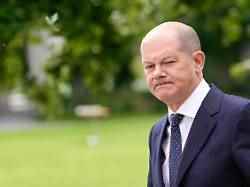Common war machine of the EU
Scholz wants to relax rules for arms exports
09/16/2022 1:02 p.m
Germany would like to develop weapon systems with its European partners. This goal will only be achieved if Berlin overcomes its strict export regulations. Chancellor Scholz advocates an examination of the rules – and commits the Bundeswehr to its core task.
Federal Chancellor Olaf Scholz has announced that the Bundeswehr will return to its core task of national and alliance defense. This is the task of the Bundeswehr, and “all other tasks have to be subordinate to it,” said Scholz in a speech at the Bundeswehr conference in Berlin. Like Defense Minister Christine Lambrecht before him, the Chancellor also spoke out in favor of reviewing the strict rules governing the export of weapons jointly developed in Europe.
“For a long time, our country avoided prioritizing the Bundeswehr’s tasks,” criticized Scholz. “Drilling wells, securing humanitarian aid, stemming floods, helping with vaccinations in times of a pandemic – a good army like the Bundeswehr can do all of this,” said the Chancellor – adding: “But that is not your core mission! The Bundeswehr’s core mission is Defense of freedom in Europe!”
The Bundeswehr must “become the cornerstone of conventional defense in Europe, the best-equipped armed force in Europe,” Scholz said. This is necessary in view of the threat posed by Russia, which is ruled by Vladimir Putin. “Putin’s Russia – we are preparing for this within the framework of NATO – is currently the greatest threat to our alliance,” said Scholz.
With the Russian war in Ukraine, “a highly armed nuclear power is trying to use force to redraw borders in Europe,” said Scholz. “If Russia got away with it, our peace in Europe would be gone for a long time.” “Only someone who doesn’t hear and read what President Putin says and writes can doubt that.”
Greens don’t want to go along with it
Scholz spoke out in favor of developing new weapon systems more closely together with the alliance partners in the future. The strict German export regulations would also have to be checked for this. According to critics, these are hampering European armaments cooperation because the jointly developed weapons for export projects are subject to strict German regulations – to the displeasure of some partner countries, which have less strict regulations.
Stronger armaments cooperation is possible “if – and this is the prerequisite – we, the member states, manage to review our national reservations and regulations with regard to the use and export of jointly manufactured systems.” Scholz added: “Some may be surprised by this – but the federal government is ready for it.” In their coalition agreement, the traffic light parties had actually agreed on a restrictive line on arms exports. Defense Minister Lambrecht had recently spoken out in favor of reviewing the strict guidelines, but had been criticized for this by the Greens.
The Chancellor spoke at the Bundeswehr conference, which this year has the motto “The Bundeswehr at a turning point – a critical inventory in times of war in Europe”. According to Lambrecht’s ministry, the focus is on “profound change processes in the Bundeswehr”. In addition to top personnel from the Bundeswehr, representatives from politics, associations and think tanks also take part.
